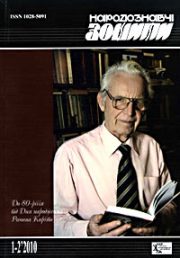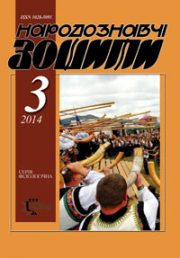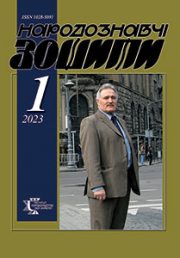The Ethnology Notebooks. 2024. № 4 (178), 835—842
UDK [398.34:633.1](=161.2:477.86)
DOI https://doi.org/10.15407/nz2024.04.835
POKUTTIA TRADITIONALITY IN CROP GROWING
PAVLYUK Stepan
- ORCID ID: https://orcid.org/0000-0003-0975-8099
- Doctor of Historical Sciences, Professor,
- Academician of NAS of Ukraine, Institute of Ethnology,
- The National Academy of Sciences of Ukraine (NASU),
- 15, Svobody Avenue, 79000, Lviv, Ukraine,
- Contacts: e-mail: ina@mail.lviv.ua
Abstract. The spring agricultural practice had such a feature that not only the livestock was prepared for it, working cattle were fattened, but also due attention was paid to the preparation of seed material — grain, potatoes, garden seedlings, seeds, etc. In addition to the acquired rational experience, farmers strengthened its effect with various magical actions — saying prayers, spells, rites and rituals of magical content with the involvement of certain things, materials, water, fire etc.
The article focuses on the issues of local traditions of the final stages of the agrotechnical process in the ethnographic Pokuttia. In particular, it is about the preparation of seed material, care in the process of its ripening, harvesting and ways of preserving the crop. The entire range of ritual actions that took place in Pokuttia with the distinction and pronouncement of a purely local origin, as well as synthesis with the involvement of the ritual scenario of neighboring ethnographic groups — Podolians, Boikos, and Hutsuls — is carefully traced.
The search for the historical genesis of certain phenomena of the technological culture of the Pokuttia people with possible local improvement of certain elements of the traditional grain-growing process is being carried out. Therefore, the purpose of the article is to study the traditional agrarian-technological process of growing grain crops in Podillia.
The object of research is the process of local agricultural technologies and tools, and the subject is technical tools and traditional skills.
The methodology is based on general scientific methodological principles and the main requirements for works of historical and ethnological direction.
Keywords: soil cultivation, ritual, sowing material, harvest, local tradition, etc.
Received 24.07.2024
REFERENCES
- Dovzhenyuk V.Y. (1961). Agriculture of Ancient Rus. Kyiv [in Ukrainian].
- Pavlyuk, S.P. (1986). Folk agricultural machinery of the Carpathian Ukrainians of the second half of the 19th and early 20th centuries. Kyiv [in Ukrainian].
- Archives of the Institute of Ethnology of the National Academy of Sciences of Ukraine. Op. 253. Sheet. 10 [in Ukrainian].
- Shukhevych, V. (1904). Hutsulshchyna Materials for Ukrainian-Russian (from Rus‘) ethnology (Part 2, vol. 4, p. 166). Lviv [in Ukrainian].
- Gorlenko, V.F., Boyko, I.D., & Kulchytskyi, O.S. (1974). Folk agricultural machinery of Ukrainians. Kyiv [in Ukrainian].
- (1981). History of cities and villages of Ivano-Frankivsk region (Pp. 20—25). Kyiv [in Ukrainian].






